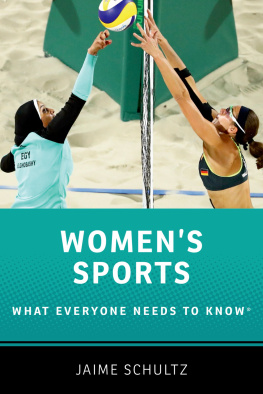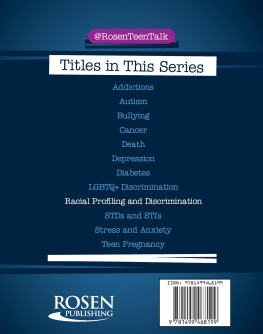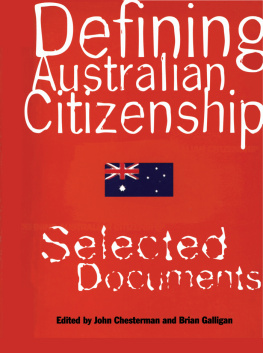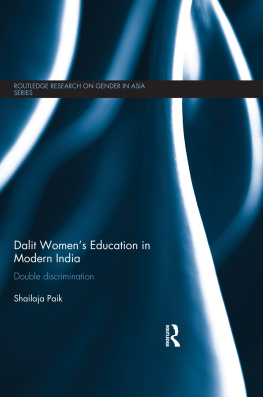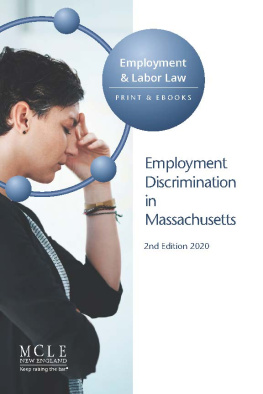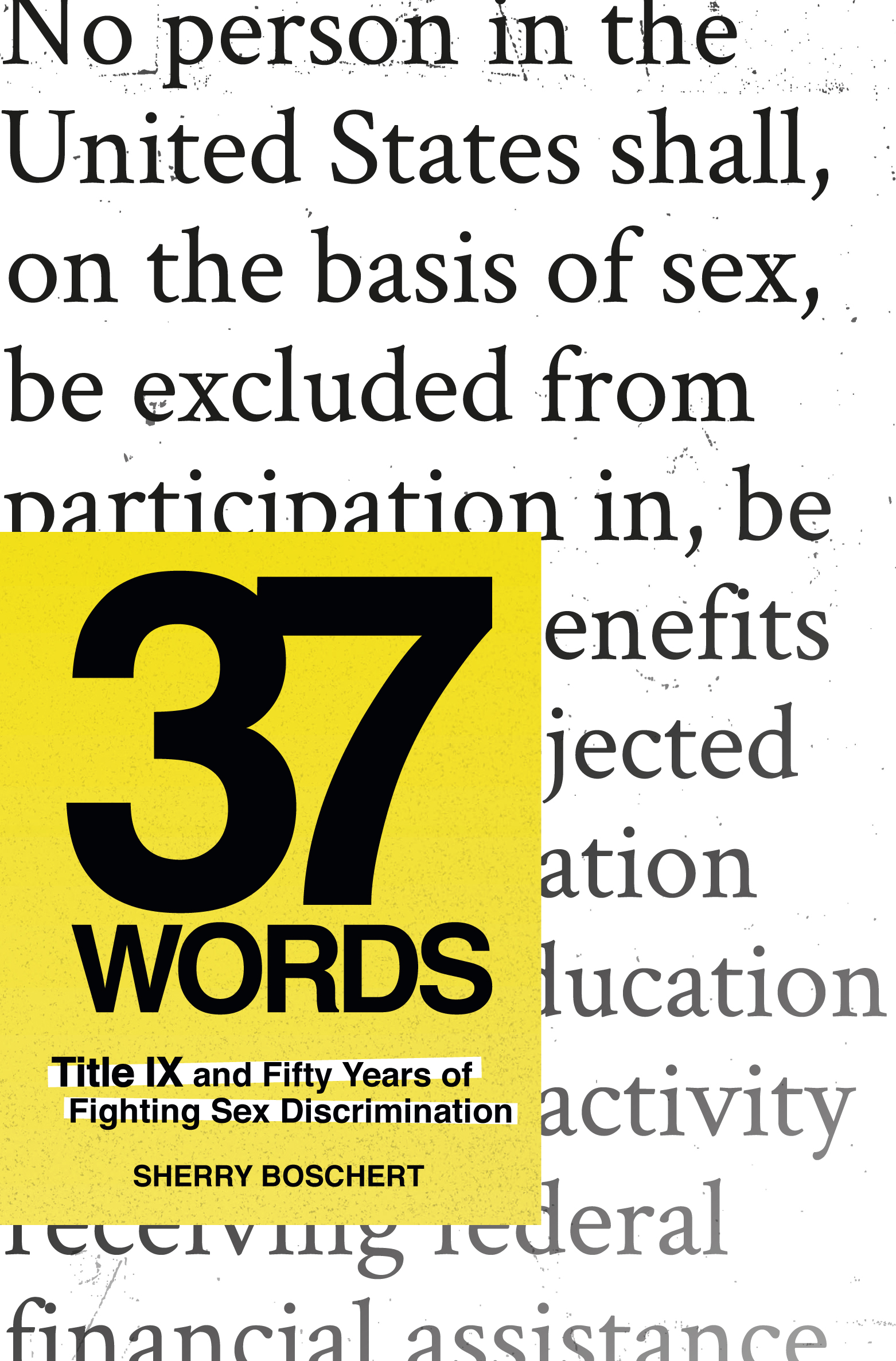Contents
Guide
Pagebreaks of the print version
Additional Praise for 37 WORDS
37 Words is a stellar and moving tribute to Title IXs fifty years of gender equity progress in schools. The book centers the champions behind this landmark lawthe authors and advocates, survivors and athletes, and every student breaking gender stereotypes to reach their dreams. Well-researched and brimming with hope, the book is an inspiration in our continued fight for gender justice for all.
Noreen Farrell, executive director, Equal Rights Advocates
Sherry Boschert captures the fight waged by feminists over decades against sex discrimination in education and to secure equal access and opportunity for women and girls. Setbacks and victories, protests and demonstrations, the fights in Congress and in the courts, are all chronicled by Boschert. 37 Words is an important book at an important time, reminding us of the need to keep fighting for Title IX.
Katherine Spillar, executive editor, Ms.
The struggle to win, implement, and preserve Title IX, the bedrock 1972 law banning sex discrimination in education, comes alive in these pages. Boscherts vivid biographical portraits of key leaders of these efforts, from the 1960s to the present, make this a page-turner that illuminates the historical roots and antecedents of the #MeToo movement.
Ruth Milkman, professor of sociology and history, CUNY Graduate Center, and author of On Gender, Labor, and Inequality
Boscherts exquisite achievement in 37 Words rests on deeply researched history, eloquent prose, and, perhaps most surprising of all, the page-turning story of how one unassuming yet brave womanBernice Sandlerturned sexist oppression into educational liberation for millions of women. There is sobering and uplifting brilliance dancing off the pages of this book, page after page. Do not miss it.
Jennifer Freyd, founder and president, Center for Institutional Courage

Title IX and Fifty Years of Fighting Sex Discrimination
SHERRY BOSCHERT

No person in the United States shall, on the basis ofsex,
be excluded from participation in,
be denied the benefits of,
or be subjected to discrimination under
any education program or activity
receiving Federal financial assistance.
Title IXs first 37 words
Contents
Strong
1969
ALONE AT HOME, HER HUSBAND AT WORK AND THE KIDS AT SCHOOL, BERnice Resnick Sandler screamed. She exulted in her Eureka! moment. Shed found itthe missing card from a deck stacked against her. Her heart quickened with her scream of discovery.
Shed found it buried in a footnote in a dry government document, part of the voluminous reading shed pursued to find a solution to her problem. Sandlers mother, Ivy Resnick, called this bibliotherapy. If you dont understand something, ask, shed say. And if you still dont understand, read. Read everything you can find about it. Ivy had been the first in her family of ten to graduate from high school. An avid reader herself, she instilled in Bernice a love of bibliotherapy.
Over the next four decades Sandler would use her discovery to change the lives of hundreds of millions of Americans, but on this day in 1969 she simply wanted a job. She knew she was qualifiedat least as qualified as the peers shed seen get hired over the last several months. The obscure note gave her the first evidence that the obstacle in her way might be illegalmight be discrimination.
At age forty-one, Sandler was about to earn a doctoral degree in education from the University of Maryland. She loved teaching college students while finishing her EdD work. Her students seemed to enjoy her classes. The department was growing, with seven tenure-track openings for new faculty. But when Sandler applied, she couldnt get an interviewnot at Maryland or any other university. The men students in her program not only got interviews but received job offers from colleges around thecountry even without interviews. How could a college in rural Pennsylvania find these men and yet her own institution couldnt seem to see her? She didnt know that the faculty were promoting men students for jobs. She didnt know the words for old boys network in 1969.
If you dont understand something, ask, she could hear Ivys voice saying. The worst they can say is no. Bernice had grown up in a large, loud, and energetic Jewish family in the Flatbush section of Brooklyn, New York. Until early adulthood she thought of herself as shy and quiet, until she realized that this was true only in relation to her family. Walking into a room at the Resnick household, youd likely hear six conversations going on at once among four people laughing and yelling and talking on top of each other. So, Sandler knew how to be social. She also understood that women were expected to be sweet and accommodating in public.
She was gifted, too, with great intelligence and high energy. Family and friends called her Bunny, a name morphed from a Yiddish version of BerniceBunya. She learned from her family to take a stand for social justice. While shoe shopping one day, Ivy and six-year-old Bernice stopped at a picket line blocking the store. Were not buying you shoes in that store, Ivy said. Bernice grew up wanting to do something to improve the world. She thought that being a college professor, teaching and doing research, might be that something.
Older than most of the students in her cohort and working part-time as a lecturer, Sandler had become friendly with some faculty when they invited her to parties. On campus one day, she worked up the courage to ask one of them about her situation.
Sandler sat down in his office. Why, she asked, couldnt she get a job interview at the University of Maryland?
Without skipping a beat, he replied, Lets face it, Bunny. You come on too strong for a woman.
Speechless, she believed him. Why had she discussed professional issues with faculty members? Why had she spoken up in graduate seminars, and a few times at staff meetings? Why had she ruined everything after coming so far?
Bernice had known from a very young age that she wanted an education and wanted to work, both things that were not taken for granted amongyoung U.S. women in the 1940s and 1950s. Both her father, Abraham, who owned a womens clothing store, and her mother, a bookkeeper and homemaker, emphasized learning. Bernice graduated from tuition-free Brooklyn College and worked part-time as a secretary while earning a masters degree in clinical and school psychology from the City University of New York. After graduation she found work again as a secretary, the most common job available to women at the time and, along with teacher, nurse, or homemaker, one of few that welcomed women if they were white.
Then she met Jerrold Sandler. They married in 1952 and moved almost immediately to Bloomington, Indiana, for his new job at the university. Intent on pursuing a doctorate degree so she could become a professor, Bernice applied to the graduate program in psychology at Indiana University but wasnt accepted. The university favored men as students and faculty.
With the Korean War escalating, Jerrold enlisted and became a naval officer. They moved eleven times in six years. Bernice was lonely, smart, and too restless to limit herself to housekeeping and raising daughters Deborah and Emily. She tried going back to school, but it was hard with a three-year-old and a four-year-old when the university wouldnt allow part-time attendance. She dropped out.


